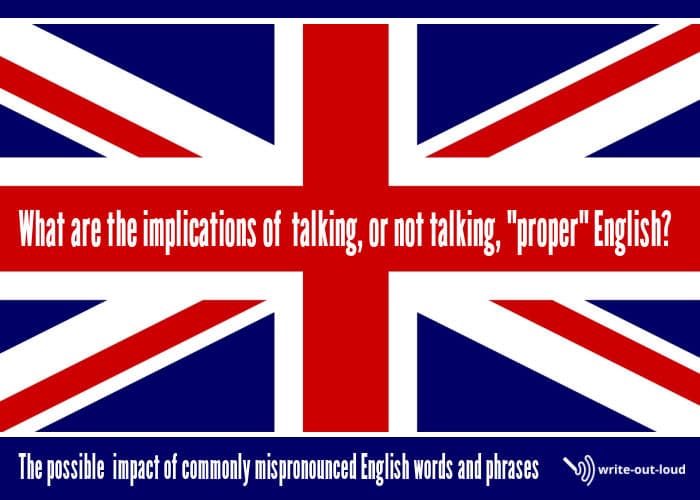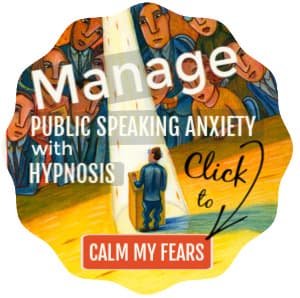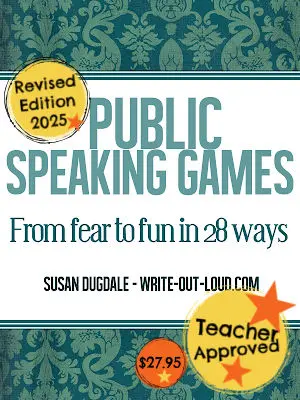- HOME ›
- Speech delivery ›
- Pronunciation
Proper pronunciation
What will speaking "proper" English do for you?
By: Susan Dugdale | Last modified: 01-09-2023
The proper pronunciation debate is ancient and not confined to English speakers. It's universal, irrespective of language.
All over the world as soon as anyone is old enough to speak, there will be someone guiding their pronunciation in an attempt to make it "right".
Do you say "I wanna " or "I want to" ?
Is it "gunna" or "going to" ?
The interpretation of "right" or "proper" varies depending on where, who you are, and what is common or accepted practice in your community.
The study of those language preferences, their differences and effects, is called sociolinguistics.
sociolinguistics
-the study of language in relation to social factors, including differences of regional, class, & occupational dialect, gender differences, & bilingualism.
See this Wikipedia page for an overview of sociolinguistics
Speaking English correctly
So what does this mean for a person who wants to speak English "correctly"?
It means developing the understanding what might be acceptable in one setting may not be in another and, having the flexibility, knowledge, and motivation to change.

The impact of sounding "wrong"
Offending your listener's ears because you say words differently to them is hardly a grievous crime. However it is one that can boomerang. The real victim of your perceived lack of "proper" pronunciation is not your audience, but potentially yourself.
For some people, mispronunciation is an irritation detracting from
whatever you are speaking about. Instead of hearing your message, your
listeners hear what they interpret as sloppy or poor English. On the
basis of that impression they judge you.
Did you know the quality of your voice helps determine what people think about you?
First impressions are not only formed and by looking good: dressing well and walking tall, but sounding good too.
Find out about voice image.
In some settings how you pronounce your words matters.
Think about a formal speech or a job interview and you'll realize the impression you create counts.
How you pronounce your words can make a positive difference.
For example:
You get the job. Or you don't get the job.
The wedding guests enjoy your speech and are eager to talk to you later. Or the wedding guests avoid eye contact and quickly turn to talk to someone else as you approach.
Aside from making sure you are saying names and any specialist vocabulary correctly, listen to yourself and really hear how you habitually speak.
Frequently mispronounced words and phrases
Here's a list of commonly mispronounced words and phrases that can quickly close off ears, hearts and minds. Many are the result of habitual speed. Slow down while trying their "proper" pronunciation (sounding the syllables clearly) out loud.
- anything, everything, nothing, something
The 'ing' is replaced with 'ink' - I am going
The words are abbreviated to 'I'm gunna' - I have got to
The words are abbreviated to 'I gotta' - I want to
The words are abbreviated to 'I wanna' - Let me
The words are abbreviated to 'Lemme' - I am not
The words are abbreviated to 'I ain't' - matter, flutter, butter, splatter, stutter...
Words with 'tt' which are pronounced as 'dd' so they become 'madder', 'fludder', 'budder' ... - ask
The 'k' gets left off. The word becomes 'ax' as in 'I wanna ax a question.' - to
Its two letters are abbreviated to one; 't' as in 'I'm gonna go t town.' - Don't you?
The phrase is abbreviated to 'Doncha?' - How did you...?, Where did you...?, What did you...?
These three are commonly abbreviated to 'howdja', 'wheredja' and 'whadja'
Examples: 'Howdja get here?', 'Wheredja come from?', 'Whadja do last night?'
Proper pronunciation training
Being able to speak "proper" English doesn't necessarily mean you're going to lose your accent or turn into a snob - a person who considers themselves better than others purely because they pronounce their words carefully.
What it will do is give you choice, more control. You can choose your pronunciation and words to fit the setting. That's got to be a useful and good thing!
Further assistance:
Here are three options for those of you who want to take it further.

- American English Online
This is a free self-paced course from Natalie Baker-Shirer (in collaboration with Renee Fisher) who teaches speech and phonetics at the Carnegie Mellon University.
From the course description:
"The purpose is not to increase your vocabulary, nor to improve your grammar, but to deal with the sounds of the words that you speak. Your message is of primary importance, but it may not be understood if your pronunciation is imprecise, inconsistent, or regional." - Check this list of 100 Beastly Mispronunciations from The Big Book Of Beastly Mispronunciations: The Complete Opinionated Guide For The Careful Speaker by Charles Harrington Elster.
You'll find less common examples than the ones I listed above. If you, or somebody you know, habitually mispronounces words like "newspaper" or "with" or "diagnosis", then this is essential. - American English Podcasts
215 free weekly lessons in pronunciation from Seattle Learning Academy especially for non-native English speakers that provide practical specialist professional advice.
More on the "way" you say it:
If you found this page useful you may be interested in:
- diction exercises - a broad range of tongue twisters (simple and complex) for articulation, with audio examples
- a very effective tongue exercise (Mrs Tongue Does Her Housework) to build dexterity and flexibility
- exercises for developing an adaptable speech rate - fast or slow when needed, rather than mono speed!
- an excellent in depth BBC article: What does your accent say about you? about the qualities we attribute to a person on the basis of their accent.




